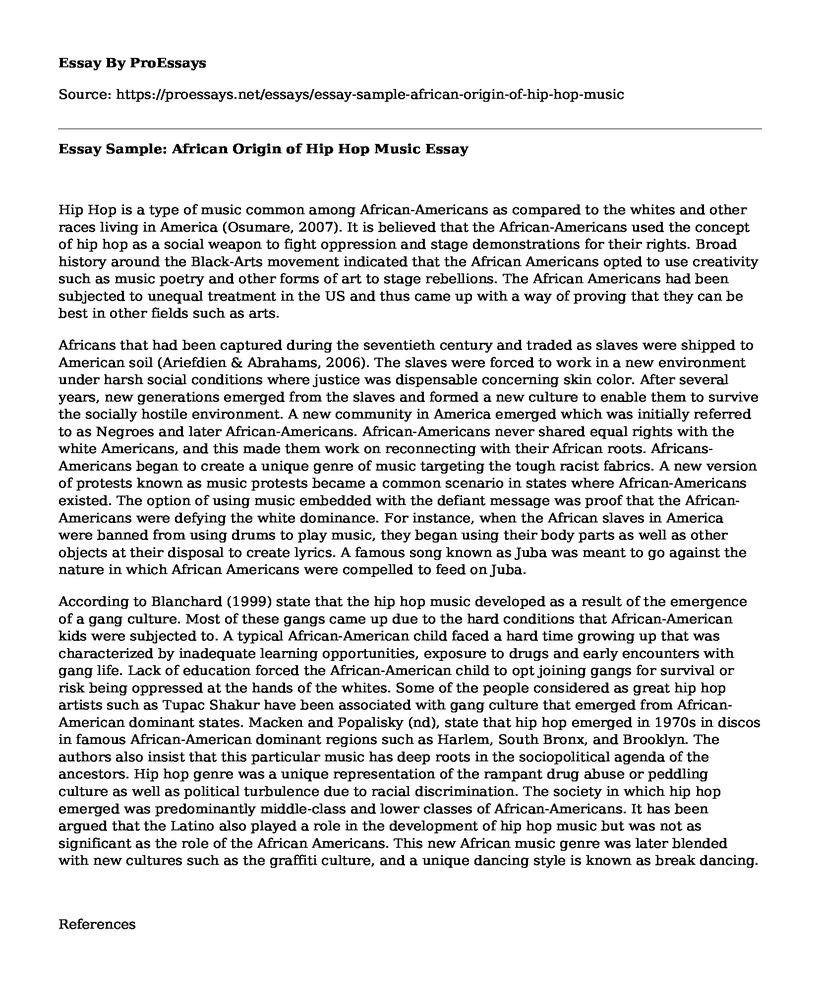Hip Hop is a type of music common among African-Americans as compared to the whites and other races living in America (Osumare, 2007). It is believed that the African-Americans used the concept of hip hop as a social weapon to fight oppression and stage demonstrations for their rights. Broad history around the Black-Arts movement indicated that the African Americans opted to use creativity such as music poetry and other forms of art to stage rebellions. The African Americans had been subjected to unequal treatment in the US and thus came up with a way of proving that they can be best in other fields such as arts.
Africans that had been captured during the seventieth century and traded as slaves were shipped to American soil (Ariefdien & Abrahams, 2006). The slaves were forced to work in a new environment under harsh social conditions where justice was dispensable concerning skin color. After several years, new generations emerged from the slaves and formed a new culture to enable them to survive the socially hostile environment. A new community in America emerged which was initially referred to as Negroes and later African-Americans. African-Americans never shared equal rights with the white Americans, and this made them work on reconnecting with their African roots. Africans-Americans began to create a unique genre of music targeting the tough racist fabrics. A new version of protests known as music protests became a common scenario in states where African-Americans existed. The option of using music embedded with the defiant message was proof that the African-Americans were defying the white dominance. For instance, when the African slaves in America were banned from using drums to play music, they began using their body parts as well as other objects at their disposal to create lyrics. A famous song known as Juba was meant to go against the nature in which African Americans were compelled to feed on Juba.
According to Blanchard (1999) state that the hip hop music developed as a result of the emergence of a gang culture. Most of these gangs came up due to the hard conditions that African-American kids were subjected to. A typical African-American child faced a hard time growing up that was characterized by inadequate learning opportunities, exposure to drugs and early encounters with gang life. Lack of education forced the African-American child to opt joining gangs for survival or risk being oppressed at the hands of the whites. Some of the people considered as great hip hop artists such as Tupac Shakur have been associated with gang culture that emerged from African-American dominant states. Macken and Popalisky (nd), state that hip hop emerged in 1970s in discos in famous African-American dominant regions such as Harlem, South Bronx, and Brooklyn. The authors also insist that this particular music has deep roots in the sociopolitical agenda of the ancestors. Hip hop genre was a unique representation of the rampant drug abuse or peddling culture as well as political turbulence due to racial discrimination. The society in which hip hop emerged was predominantly middle-class and lower classes of African-Americans. It has been argued that the Latino also played a role in the development of hip hop music but was not as significant as the role of the African Americans. This new African music genre was later blended with new cultures such as the graffiti culture, and a unique dancing style is known as break dancing.
References
Ariefdien, S., & Abrahams, N. (2006). The Art And Aesthetics of Hip Hop. New York: Basic Civitas.
Blanchard, B. (1999). The Social Significance of Rap & Hip-Hop Culture. Retrieved February 13, 2017, from Ethics of Development in Global Environment: http://hiphoparchive.org/sites/default/files/the_social_significance_of_rap_hip_hop_culture.pdf
Macken, T., & Popalisky, D. (nd). The Origins of Hip Hop Finding a New Cultural Identity. Retrieved February 14, 2017, from https://webpages.scu.edu/ftp/aadh/tara.pdf
Osumare, H. (2007). The Africanist Aesthetic in Global Hip-Hop: Power Moves. New York: Palgrave Macmillan.
Cite this page
Essay Sample: African Origin of Hip Hop Music. (2021, Apr 06). Retrieved from https://proessays.net/essays/essay-sample-african-origin-of-hip-hop-music
If you are the original author of this essay and no longer wish to have it published on the ProEssays website, please click below to request its removal:
- Happy Days, Season 1, Episode 1 - All the Way. Movie Review Example.
- Film and the Senses Essay
- Political Symbolism Essay
- Mamma Mia Video Review Paper Example
- The Red Pill Blues Concert by Maroon 5 Plan
- Essay Example on Global Exploitation of Migrant Workers: Historical Overview
- Modern Table: Analyzing an Expressive Performance of 'Darkness PooBa' - Essay Sample







